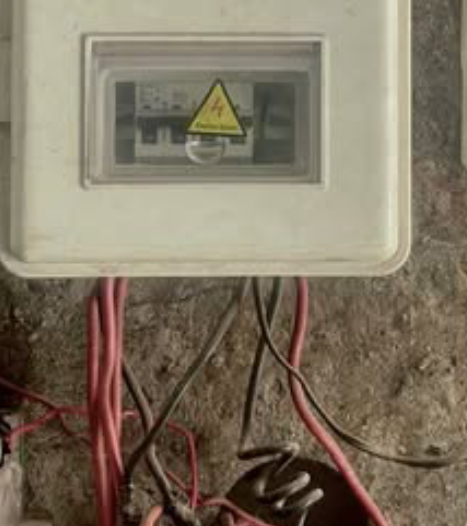
Shock in the Wires: Woman Discovers Former Tenant Secretly Tapped Neighbor’s Electricity After Strange Power Readings

When a Nigerian woman moved into her new apartment, she expected to adjust to the usual rising costs of living, particularly the burden of electricity bills that have become an everyday complaint across the country. However, what she discovered nearly a month into her stay left her both bewildered and disturbed, sparking conversations online about the audacity and desperation of some tenants. Sharing her experience on social media, the woman who tweets under the handle Copywriter-Soye revealed that she had grown suspicious when her electricity usage remained unusually low, even though she was using heavy appliances every day. “I moved into a new place and in almost one month, I hadn't used up to 15 units despite using a freezer and microwave every day,” she wrote. Nigerians familiar with prepaid meters immediately understood the oddity of her situation—freezers and microwaves are notorious for consuming a significant amount of power.
Her curiosity eventually got the better of her. She invited someone to inspect the wiring, suspecting that something about her electricity setup wasn’t adding up. To her shock, the technician discovered that the former tenant of her apartment had ingeniously but illegally tapped into someone else’s electricity supply. “Last week, I got curious. Called someone to come check it and found out the previous occupant had tapped someone else's light. Whose light? We don’t know. I just dey pity the person cuz what?!,” she shared. The bizarre discovery highlights a troubling yet common problem in many Nigerian neighborhoods, where illegal connections, electricity theft, and unmonitored wiring are rampant. Often, landlords, tenants, and neighbors only realize what’s happening when bills become outrageously high or, in this case, strangely low.
The woman admitted she was unsettled by what she found and immediately asked the electrician to disconnect the illicit connection before leaving. She added, “I sha asked the man to disconnect it before leaving. Things people do ehn?” Her account quickly gained traction, with many social media users expressing shock, amusement, and dismay at the audacity of the former tenant. Some joked about how they could never be so bold, while others pointed out the financial and ethical implications of such actions. Electricity theft is not a new phenomenon in Nigeria. It is estimated that billions of naira are lost annually by electricity distribution companies due to illegal connections, meter bypassing, and other forms of energy theft. While some perpetrators see it as a way of beating a system that they perceive as exploitative or unreliable, the ripple effects are often felt by innocent consumers who end up paying higher tariffs to cover the losses.
Beyond the financial consequences, there are also serious safety risks. Illegal connections are often done haphazardly, with wires running through unsafe spaces and without proper grounding. This increases the chances of electrical fires, electrocution, and even widespread outages in certain communities. For the unlucky neighbor whose power had unknowingly been feeding someone else’s freezer and microwave for who knows how long, the shock would only come when they tried to reconcile their inflated bills or noticed unexplained drops in their meter balance. Nigerians online could not help but sympathize with the anonymous victim of the tapped line. “Imagine suffering to load units every week and not knowing you’re powering somebody else’s whole kitchen,” one commenter wrote. Others wondered whether the landlord was aware of the connection, while some accused the electricity distribution companies of negligence in not monitoring or detecting such irregularities sooner.
The woman’s story has also ignited debates about tenant responsibility and landlord accountability. Many argued that before moving into a new place, tenants should ensure that meters are checked, verified, and reset where necessary. Landlords, on the other hand, were criticized for sometimes overlooking these details, especially in cases where previous tenants leave without officially disconnecting or regularizing their usage. Still, what stands out from this incident is not just the illegal act itself but the boldness of the former tenant. The idea that someone would comfortably tap into a neighbor’s electricity for an extended period, running appliances daily without remorse, speaks volumes about the growing frustration many face over the cost of living and inadequate supply of basic utilities. In a country where electricity remains unstable and bills keep climbing despite inconsistent service, some resort to questionable survival tactics.
Yet, as many social media users pointed out, such shortcuts are far from harmless. They not only transfer the burden of payment to unsuspecting victims but also create tensions among neighbors. It’s not uncommon for disputes over mysteriously high electricity bills to escalate into bitter quarrels and even physical fights in Nigerian communities. In fact, several users who reacted to her story shared similar experiences of discovering that their meters were unknowingly supplying power to other apartments or shops, some for months before being detected. For Copywriter-Soye, however, the ordeal was nipped in the bud before she could settle into the same cycle of frustration. Her quick decision to investigate what seemed like a “too good to be true” low consumption saved her from inadvertently enjoying someone else’s electricity at their expense.
As her story spreads, it also serves as a reminder to new tenants everywhere to check their meters and electrical connections thoroughly before settling into a new home. While the temptation might be to rejoice at unusually low bills, the truth could be far from fortunate. In her closing remarks, she summed up the sentiment with disbelief at the extent people go just to dodge bills: “Things people do ehn?” Indeed, her discovery is not just a reflection of one former tenant’s audacity but of a much larger issue facing Nigerian society—a system where inefficiencies, economic hardship, and survival instincts collide, leaving behind stories that are both shocking and sadly unsurprising.
The anonymous victim whose electricity was tapped may never know who drained their units all that time, but their plight resonates with countless others who silently shoulder the burden of electricity theft. For now, one woman’s vigilance has prevented her from becoming another statistic in Nigeria’s endless struggle with light, bills, and the never-ending ingenuity of those who refuse to pay for what they use.


